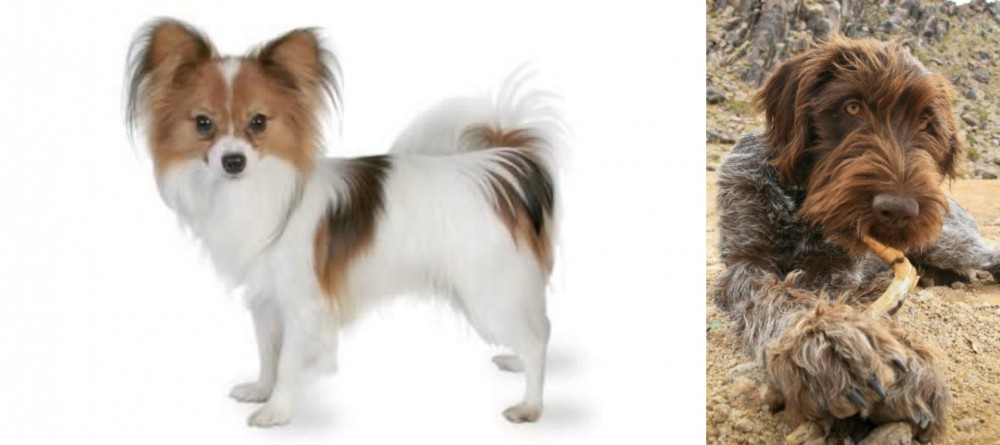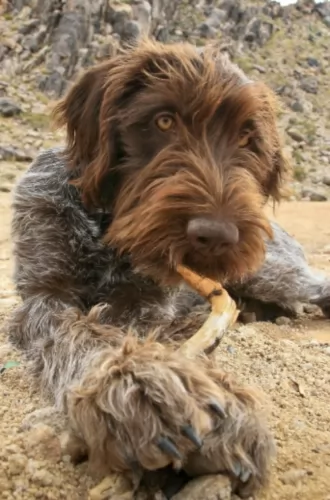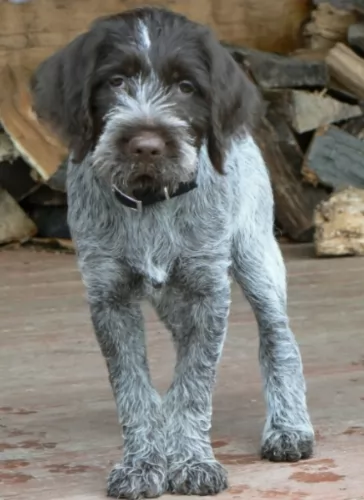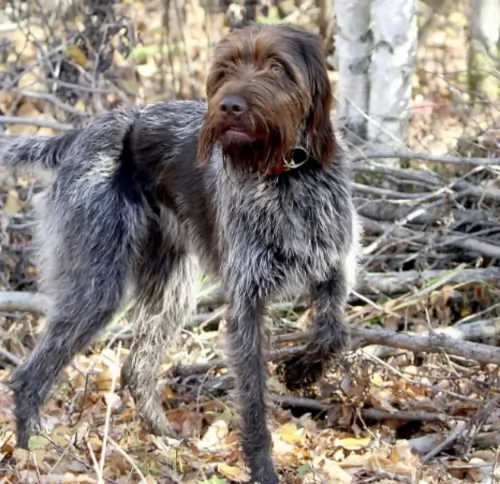 Petzlover
Petzlover Both Papillon and Wirehaired Pointing Griffon are originated from France. Papillon may grow 32 cm / 12 inches shorter than Wirehaired Pointing Griffon. Papillon may weigh 22 kg / 48 pounds lesser than Wirehaired Pointing Griffon. Papillon may live 3 years more than Wirehaired Pointing Griffon. Papillon may have less litter size than Wirehaired Pointing Griffon. Both Papillon and Wirehaired Pointing Griffon requires Moderate Maintenance.
Both Papillon and Wirehaired Pointing Griffon are originated from France. Papillon may grow 32 cm / 12 inches shorter than Wirehaired Pointing Griffon. Papillon may weigh 22 kg / 48 pounds lesser than Wirehaired Pointing Griffon. Papillon may live 3 years more than Wirehaired Pointing Griffon. Papillon may have less litter size than Wirehaired Pointing Griffon. Both Papillon and Wirehaired Pointing Griffon requires Moderate Maintenance.
 With his eye-catching butterfly-look-alike feathery ears, the Papillon, also called the Continental Toy Spaniel or the Squirrel Spaniel, is one of the oldest of the toy spaniels.
With his eye-catching butterfly-look-alike feathery ears, the Papillon, also called the Continental Toy Spaniel or the Squirrel Spaniel, is one of the oldest of the toy spaniels.
You can see that the history of the Papillon goes very far back as the dog has been depicted in early works of art dating back to the 1500s. They were at first bred for the companions of noblewomen, appearing in many paintings where they are seen in royal courts.
The AKC registered its first Papillon in 1915. It is believed that the dog hails from France and Belguim. The Papillon was first recognized by the AKC in 1935 and the Papillon Club of America was also formed.
 Known also as the Korthals Griffon, the Wirehaired Pointing Griffon is a hunting- and gundog. It was Eduard Karel Korthals who is thought to have brought about this dog breed around 1873.
Known also as the Korthals Griffon, the Wirehaired Pointing Griffon is a hunting- and gundog. It was Eduard Karel Korthals who is thought to have brought about this dog breed around 1873.
He was a Dutchman living in France. It is believed that quite a few dog breeds were used to bring about this dog such as the Otterhound, Spniels, Setters and possibly a Pointer. The dog is known as a supreme gundog and it is a very popular dog breed.
Edward Korthals of Holland was looking for an ideal gun dog. It was in 1888 that the first Griffon Club was formed. It was only in 1916 that this dog was officially recognized as the Wirehaired Pointing Griffon in the United States.
 Papillon means 'butterfly' which refers to the dog's fringed upright ears. You also get the floppy eared variety which is known as phalene, meaning 'moth'.
Papillon means 'butterfly' which refers to the dog's fringed upright ears. You also get the floppy eared variety which is known as phalene, meaning 'moth'.
The Papillon dog stands at between 20 – 28cm in height and weighs between 3 and 4.5kg. The tail arches over the back in a feathery plume. His coat is thick and silky but he doesn't have an undercoat. The coat is white with tan or white with black.
When you look at his bright little face, you can see that he is an intelligent dog who can be trained and socialized with ease. In fact he loves to be occupied with something challenging, so it will be a good ides to buy him some stimulating toys to play with.
When you first see the Papillon dog you might think he is fragile like a butterfly – a typical lap dog – but this isn't so at all. He is tough, robust, energetic, alert and friendly. Bright and alert, they also make great watchdogs.
He'll be able to adapt to life in the city or the countryside. Even though he is good with children and pets in the home, he'd prefer to live with adults as he couldn't handle undisciplined rough and tumble children who haven't learned how to respect dogs, especially little ones that can get hurt easily.
This is such a sweet-natured little dog that you want to do everything you can to keep him content
 The Wirehaired Pointing Griffon or Korthals Griffon is a medium-to-large sized dog standing at between 50 and 60cm both male and female and weighing between 23and 27kg.
The Wirehaired Pointing Griffon or Korthals Griffon is a medium-to-large sized dog standing at between 50 and 60cm both male and female and weighing between 23and 27kg.
He has a wiry, somewhat harsh curly outer coat and a softer undercoat. The head is quite large. He has thick eyebrows and a beard. The eyes are brown with yellow irises.
This is a low-shedding dog. There are a few colors such as white and brown, white and orange but the coat is also steel gray with brown markings.
These dogs are intelligent and independent with a desire to please their owners. He is able to learn tricks and commands easily. They love their human families and want to be around them all the time.
It would be devastating for such a dog to find himself stuck in the backyard with no human contact. He is also not suited to cramped living conditions in the city but is essentially a country dog, especially since he has boundless energy.
As a family pet, he is playful, friendly, loyal, loving and gentle, behaving well with children and other pets. They’re not aggressive dogs but they make excellent watchdogs, barking if someone comes into their property.
 The Papillon is a bright, intelligent and energetic little dog. When you bring him into your home you must remember that small though he is, he will require lots of mental and physical exercise.
The Papillon is a bright, intelligent and energetic little dog. When you bring him into your home you must remember that small though he is, he will require lots of mental and physical exercise.
You're going to love having the Papillon in your home as he is guaranteed to make the sweetest, most loving pet and companion.
 The Wirehaired Pointing Griffon has always been a great hunting dog and he doubles as an excellent pet and companion as well.
The Wirehaired Pointing Griffon has always been a great hunting dog and he doubles as an excellent pet and companion as well.
This dog is extremely loyal to his human family and is friendly, intelligent, loving and affectionate, getting on well with children as well as other pets in the home.
He can reach 14 years of age and doesn’t often get sick, making him an all-round great pet and companion.
 As a responsible dog owner you want to make sure that your pet has the best chance to reach the age of 14, 15 or 16. Unfortunately, there are always some common dog illnesses that you need to be aware of -
As a responsible dog owner you want to make sure that your pet has the best chance to reach the age of 14, 15 or 16. Unfortunately, there are always some common dog illnesses that you need to be aware of -
This condition occurs when the dog's patella or kneecap is dislocated and then it can only be returned to its normal position once the quadriceps in the hind legs of the dog relax and lengthen. You’ll see dogs with this condition holding up a hind leg. This joint abnormality is more common in toy breeds like this.
The windpipe of a dog is made out of tissue membranes and when the dog breathes, air quickly moves through the trachea, causing the pressure inside of it to go down. A weak cartilage in the windpipe causes a collapsed trachea in dogs, and occurs almost exclusively in small dogs such as the Papillon.
Many small dogs are born with cartilage that is strong enough to hold the trachea open. As cartilage ages though, it weakens. You’ll notice your dog has a rasping cough when he is excited. Sometimes it is mistaken for kennel cough which can be remedied fairly quickly while a collapsed trachea in dogs is a lifelong syndrome.
 Papillons are average shedders so they will require brushing at least twice a week. Certainly the long ear fringes will need to be washed and brushed, after all this is this little dog’s trademark.
Papillons are average shedders so they will require brushing at least twice a week. Certainly the long ear fringes will need to be washed and brushed, after all this is this little dog’s trademark.
You’ve got to be careful with a small dog like the Papillon as it can easily become overweight and that in itself can bring on health problems. There are excellent commercially manufactured dog foods for small breed dogs that have the right amount of minerals and vitamins in them. Choose the best quality ones.
Home-made food such as chopped-up boiled chicken, some brown rice or pasta and cooked vegetables such as carrots, spinach and sweet potatoes can keep your little dog healthy and fit. Dogs just want simple, nutritious meals which aren’t changed often as it could upset their digestive system.
Keep things consistent and avoid human foods such as chips, chocolates, coffee and spices Never leave your pet without a steady supply of fresh, cool water.
Provide your pet with a nice warm, dry bed.
If you bring a puppy into the home, check on puppy vaccines to avoid some deadly diseases.
Get your dog neutered or spayed if you don’t want it to become a parent.
Exercise your pet and provide him with love and attention.
 This dog loves his exercise, and if you live in the country so much the better. He will love to go hiking and swimming with you or running next to you as you go cycling. He also loves all kinds of rope- and ball games in the garden. It’s why this active dog isn’t ideal for life in the city.
This dog loves his exercise, and if you live in the country so much the better. He will love to go hiking and swimming with you or running next to you as you go cycling. He also loves all kinds of rope- and ball games in the garden. It’s why this active dog isn’t ideal for life in the city.
Spay or neuter your pet if you don’t want unwanted puppies. Don't do it too early. Speak to your vet about the procedure and about the health benefits that come from spaying and neutering a dog.
These are active dogs and they will require top quality food if they’re to remain healthy and active.
Always check the packaging to see what ingredients are present in your dog’s food. Some of the cheaper, more inferior brands can actually be harmful to your pet with their useless ingredients devoid of vitamins and minerals.
Some home-made food is good and this needs to be plain and free from spicy additives. Dogs have sensitive stomachs and anything unusual can cause them digestive problems.